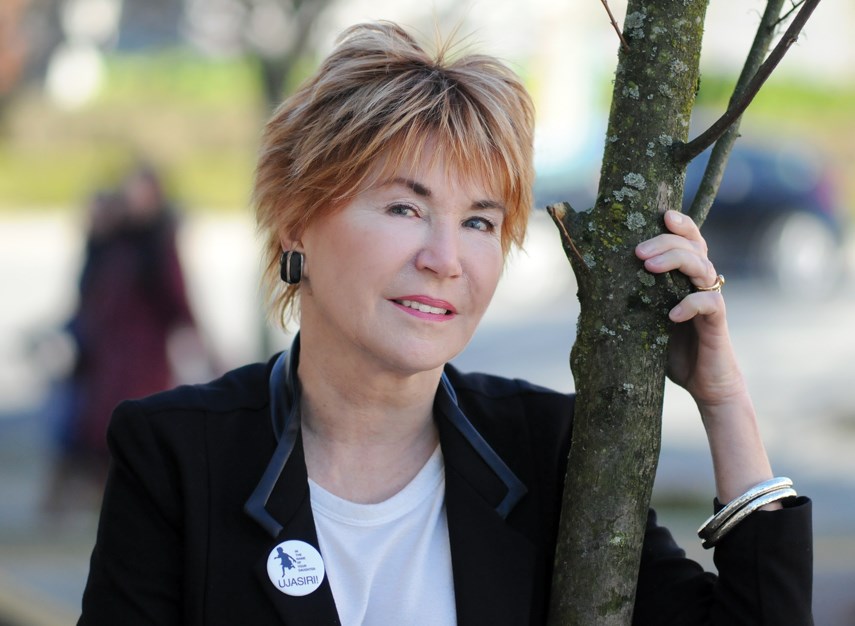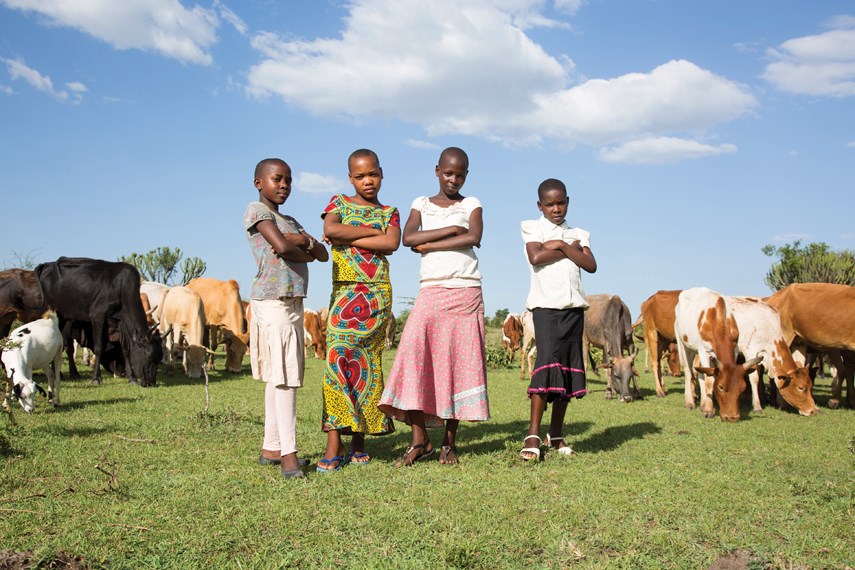In The Name Of Your Daughter, fundraising and screening of film, Kay Meek Arts Centre, Sunday, Feb. 3, reception 5:30 p.m., kaymeek.com/events/in-the-name-of-your-daughter.
Be horrified – but don’t look away. There’s more here than horror.
It’s December and a young girl is running across Tanzania’s Serengeti.
Her family may be chasing her.
The fleeing girl loves them. She wants to live with them.
But she keeps running.
In December, known as the cutting season, hundreds of girls across Tanzania are forced to undergo female genital mutilation.
“People physically flinch when you mention the term,” notes documentarian Giselle Portenier.
There are approximately three million girls worldwide at risk of FGM every year, according to the World Health Organization. It is, Portenier says, “the most egregious human rights abuse perpetrated against girls and women in the world today.”
But how do you make a documentary about such a singularly revolting and inhuman ritual?
You focus on humanity, Portenier explains.
“I always start talking about my film by saying, ‘It’s about the bravest girls in the world.’”
Who do you trust?
The young girl, Rhobi, watches a video of her mother.
Rhobi shouldn’t be afraid, her mother explains.
I will not beat Rhobi. I will not cut her. I abandoned those traditions, her mother swears.
The safe house co-ordinator plays the message. Then she looks at the 11-year-old girl and asks: “Do you trust your mother’s words?”
That question, like everything that led to it, is too much to put on a little girl.
Rhobi looks down.
Portenier’s camera captures her body language as she considers her words.
Mama is just talking, Rhobi explains. “But if I go home ....”
There’s no need to finish the sentence.
For her safety, Rhobi will stay in the house.
Over the course of seven weeks, Portenier amassed 120 hours of footage of the girls in the safe house. She generally shot in the day and sent out fundraising emails at night, eventually garnering close to $100,000.
She told the girls what she was doing and asked them to trust her.
We see the girls play games and sing songs. Some are shy, some funny but they are all resolute.
One discusses her trip to the safe house. She was afraid of being trampled by an elephant or bit by a snake, she says. She still made the journey.
Overseeing the girls at the safe house is Rhobi Samwelli.
A survivor of FGM herself, Samwelli welcomes, accommodates and comforts the girls at the safe house while cajoling, hectoring and reasoning with parents.
“They look at me like their enemy,” Samwelli acknowledges. She smiles.
Debating the inarguable
A girl who is cut will be clean, a young man explains.
At a small village gathering, Portenier sets her camera amid Tanzania’s version of bro culture and captures their ready-made arguments for the status quo.
One man uses the bible to defend FGM, explaining the assault helps girls mature.
FGM is frequently considered a prerequisite for marriage, Portenier explains. Considered property of their father, the girls are: “Sold like chattel, for cattle.”
The value of young brides is measured in cows. A girl who has been mutilated is worth more cows than a girl who has not. It sometimes seems to be a truth acknowledged by everyone except Samwelli.
With a microphone in her hand, Samwelli is determined to reach even the smallest minds and coldest hearts.
“You look at your sister and all you see are cows,” she tells the village.
Reaction shots show nothing in the way of a reaction from the assembled men, but Samwelli is undaunted.
Another sequence follows Samwelli at a cattle market as she chats up uncomfortable young men about whether they’ll marry a cut or un-cut girl.
A cut girl, the young man responds.
At that point Samwelli slips an arm around his shoulders. “Do you know,” she asks, “that FGM has harmful effects?
The man’s body language suggests he would rather do anything than continue the conversation, but he can’t help but asking: “What effects?”
She tells him.
Another man tells Samwelli that un-cut girls are more promiscuous.
But infidelity is frequent, Samwelli reminds him. “So cutting doesn’t help, does it?”
It doesn’t seem like the men’s minds have been opened. But they look slightly moved, like wind just gusted into an airtight vault.

And yet she persists
The girls have different dreams. They want to be politicians, doctors, soldiers but what they really want to be right now is intact.
“One lucky day God looked out for me,” explains Rosie, a 12-year-old who ran when she found out her father’s plan for her.
She should submit to being cut, her father had told her. After all, it was her grandfather’s dying wish.
What if I die? Rosie responds. “Will your father wake up and bring me back to life?”
As a Christian, FGM seems almost blasphemous to Rosie.
“If that little thing wasn’t of any use He wouldn’t have given it to us,” Rosie explains.
It’s important to realize that female genital mutilation isn’t the property of a single region or religion, Portenier notes.
“I think Canadians mistakenly believe that FGM is an Islamic practice,” she says. “FGM predates Islam and it predates Christianity and it’s practised among Christians and Muslims and Pagans.”
It is not a religious rite, she adds. It’s abuse.
“We have been so concerned about respecting the sensitivities of the adults that we have sacrificed the human rights of the children,” she says.
Portenier is hopeful the film will empower viewers to want to protect those human rights.
She’s planning to screen the documentary for elected officials in the United Kingdom and Australia. But so far one of the most heartening screenings was in a village in Tanzania last July.
Three girls came to the safe house the next day, she reports. One of them was brought by her brother.
“It really is a story of children who are standing up for their human rights,” she says. “My dream is to have it in every school in Canada.”
Finding an audience
Malaika Somji is hosting a screening of In The Name of Your Daughter at Mulgrave School on Friday afternoon.
FGM is a tough topic, she says. Students are largely uncomfortable talking or even hearing about it.
But reluctance to discuss mutilation is one of the reasons the “silent suffering” of millions of girls and women continues, she notes.
“I felt embarrassed and kind of ashamed that I didn’t know such a despicable act of torture and violation was taking place,” she says. “I have younger sisters, so it hits home.”
Somji is doing her part to continue the conversation in person and online with
#FGMIsMyIssueToo.
Somji’s leadership is exactly what Portenier was hoping to inspire with the film, she says.
“As a 16-year-old, she is leading the way to make change.”



